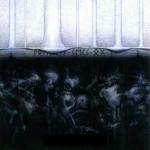In a world where all novels were standalones...
#21

Posted 11 February 2019 - 10:25 PM
Or give us his email, phone, home address, maybe a decent physical description, and we can ask him ourselves.
Politely.
And with absolutely no holistic hallucinogens, alligator clips, car batteries, and semi-reanimated severed alpaca heads.
Or gerbils. Absolutely no gerbils.
Politely.
And with absolutely no holistic hallucinogens, alligator clips, car batteries, and semi-reanimated severed alpaca heads.
Or gerbils. Absolutely no gerbils.
THIS IS YOUR REMINDER THAT THERE IS A
'VIEW NEW CONTENT' BUTTON THAT
ALLOWS YOU TO VIEW NEW CONTENT
'VIEW NEW CONTENT' BUTTON THAT
ALLOWS YOU TO VIEW NEW CONTENT
#22

Posted 11 February 2019 - 10:59 PM
What he's missing (imo) isn't how GotM is informed by the rest of the series, but how GotM is in conversation with other novels, particularly other fantasy novels. That's a large part of what makes it great in and of itself.
They came with white hands and left with red hands.
#23

Posted 12 February 2019 - 05:29 AM
No. What he’s missing is gerbils.
THIS IS YOUR REMINDER THAT THERE IS A
'VIEW NEW CONTENT' BUTTON THAT
ALLOWS YOU TO VIEW NEW CONTENT
'VIEW NEW CONTENT' BUTTON THAT
ALLOWS YOU TO VIEW NEW CONTENT
#24

Posted 12 February 2019 - 05:51 AM
It can be both!
They came with white hands and left with red hands.
#25

Posted 12 February 2019 - 09:15 AM
#26

Posted 12 February 2019 - 03:35 PM
yesssssssss.... yessssssss... give him to usss......
THIS IS YOUR REMINDER THAT THERE IS A
'VIEW NEW CONTENT' BUTTON THAT
ALLOWS YOU TO VIEW NEW CONTENT
'VIEW NEW CONTENT' BUTTON THAT
ALLOWS YOU TO VIEW NEW CONTENT
#27

Posted 14 February 2019 - 12:55 AM
Gorefest, on 06 February 2019 - 05:57 PM, said:
Yes, easily. There are several individual MBotF novels that blow many other fantasy novels clean out of the water. Has he actually read any of the novels? Or can you get a PhD in this sort of stuff simply by posturing?
Real talk: at least like 25% of successful PhDing is posturing lol. There's a reason "fake it till you make it" is basically the number 1 motto in grad school.
Anyways, my thoughts regarding the actual topic:
"Oh, I don't read fantasy books that are in trilogies/ series--how trite, I read real fantasy like The Once and Future King"
To me it seems similar to the literary vs. genre writing arguments (e.g. literary writing is high art/culture, genre writing is low art/culture)-- its all about gatekeeping, and maintaining a distinction between the 'cultural elites' and the 'unwashed rabble'
But maybe thats unfair, I dunno, I'll never understand how literary/english PhDs work.
#28

Posted 14 February 2019 - 04:29 PM
rant, on 14 February 2019 - 12:55 AM, said:
Anyways, my thoughts regarding the actual topic:
"Oh, I don't read fantasy books that are in trilogies/ series--how trite, I read real fantasy like The Once and Future King"
To me it seems similar to the literary vs. genre writing arguments (e.g. literary writing is high art/culture, genre writing is low art/culture)-- its all about gatekeeping, and maintaining a distinction between the 'cultural elites' and the 'unwashed rabble'
But maybe thats unfair, I dunno, I'll never understand how literary/english PhDs work.
"Oh, I don't read fantasy books that are in trilogies/ series--how trite, I read real fantasy like The Once and Future King"
To me it seems similar to the literary vs. genre writing arguments (e.g. literary writing is high art/culture, genre writing is low art/culture)-- its all about gatekeeping, and maintaining a distinction between the 'cultural elites' and the 'unwashed rabble'
But maybe thats unfair, I dunno, I'll never understand how literary/english PhDs work.
I think that's a gross misinterpretation of pretty much the whole argument.
#29

Posted 14 February 2019 - 09:40 PM
D, on 07 February 2019 - 09:39 PM, said:
Both the Chain of Dogs from DG and Midnight Tides overall are something of a "the bad guys win" ending which would only really be standalone as tragedies.
Yes, and...?
"Here is light. You will say that it is not a living entity, but you miss the point that it is more, not less. Without occupying space, it fills the universe. It nourishes everything, yet itself feeds upon destruction. We claim to control it, but does it not perhaps cultivate us as a source of food? May it not be that all wood grows so that it can be set ablaze, and that men and women are born to kindle fires?"
―Gene Wolfe, The Citadel of the Autarch
―Gene Wolfe, The Citadel of the Autarch
#30

#31

Posted 16 February 2019 - 09:36 PM
But in the grand scheme of things, Midnight Tides only has bad guys. There are some decent people trying to do good (or just to get by), but the central conflict is Mad Zombie Jesus versus Wild Capitalism. There's no positive outcome here.
To the main point: a fan forum for a book series is an interesting choice of a place to ask if individual books in the series are any good Like, of course we think they are. We love them! And I can't wrap my head around the idea of what you called a
Like, of course we think they are. We love them! And I can't wrap my head around the idea of what you called a
Does something like this even exist in literature? Or in any form of storytelling? I struggle to imagine, say, a show where each episode is kind of meh and after the whole season I say it was fantastic. And as for adding up to a greater whole that's bigger than the sum of its parts - for a series, that's table stakes. You serialize because you believe the larger story you have to tell is better than you could deliver in a single, standalone unit.
To the main point: a fan forum for a book series is an interesting choice of a place to ask if individual books in the series are any good
Quote
book series in which several mediocre novels add up to a greater whole
Does something like this even exist in literature? Or in any form of storytelling? I struggle to imagine, say, a show where each episode is kind of meh and after the whole season I say it was fantastic. And as for adding up to a greater whole that's bigger than the sum of its parts - for a series, that's table stakes. You serialize because you believe the larger story you have to tell is better than you could deliver in a single, standalone unit.
#32

Posted 19 February 2019 - 10:36 PM
Siergiej, on 16 February 2019 - 09:36 PM, said:
Quote
book series in which several mediocre novels add up to a greater whole
Does something like this even exist in literature? Or in any form of storytelling? I struggle to imagine, say, a show where each episode is kind of meh and after the whole season I say it was fantastic. And as for adding up to a greater whole that's bigger than the sum of its parts - for a series, that's table stakes. You serialize because you believe the larger story you have to tell is better than you could deliver in a single, standalone unit.
Maybe "fantastic" isn't the right word for the combined whole, but I feel like Mistborn is along those lines. I any given book and/or storyline in the trilogy mostly pretty boring/trite/annoying, but the endings of each of the three books and the way the overall story fits together make me like it as a whole.
#33

Posted 20 February 2019 - 07:23 PM
Zetubal, on 14 February 2019 - 04:29 PM, said:
rant, on 14 February 2019 - 12:55 AM, said:
Anyways, my thoughts regarding the actual topic:
"Oh, I don't read fantasy books that are in trilogies/ series--how trite, I read real fantasy like The Once and Future King"
To me it seems similar to the literary vs. genre writing arguments (e.g. literary writing is high art/culture, genre writing is low art/culture)-- its all about gatekeeping, and maintaining a distinction between the 'cultural elites' and the 'unwashed rabble'
But maybe thats unfair, I dunno, I'll never understand how literary/english PhDs work.
"Oh, I don't read fantasy books that are in trilogies/ series--how trite, I read real fantasy like The Once and Future King"
To me it seems similar to the literary vs. genre writing arguments (e.g. literary writing is high art/culture, genre writing is low art/culture)-- its all about gatekeeping, and maintaining a distinction between the 'cultural elites' and the 'unwashed rabble'
But maybe thats unfair, I dunno, I'll never understand how literary/english PhDs work.
I think that's a gross misinterpretation of pretty much the whole argument.
I mean obviously it is a misinterpretation of the argument lol. But when the argument can be summed up as:
" I don't like those books because they aren't stand alone" and then sticking your fingers in your ears and going na-na-na I can't hear you.....
People are going to misinterpret the argument.
I dunno, it seems like he is trying to create an artificial divide between what he likes and what others (us plebs) like. Which is fine...preferences exist. But the second a descriptive preference ( I prefer standalone fantasy novels) becomes a prescriptive requirement (only standalone fantasy novels are good/quality/worthwhile) is the second I suspect some gatekeeping is occurring. I guess the way to test that assumption is to explicitly ask him if 'good' fantasy only exists in stand alone books. If yes, ask why, respectfully listen to his arguments, and then tell him to go pound sand.
#34

Posted 22 February 2019 - 11:56 AM
rant, on 20 February 2019 - 07:23 PM, said:
I mean obviously it is a misinterpretation of the argument lol. But when the argument can be summed up as:
" I don't like those books because they aren't stand alone" and then sticking your fingers in your ears and going na-na-na I can't hear you.....
People are going to misinterpret the argument.
I dunno, it seems like he is trying to create an artificial divide between what he likes and what others (us plebs) like. Which is fine...preferences exist. But the second a descriptive preference ( I prefer standalone fantasy novels) becomes a prescriptive requirement (only standalone fantasy novels are good/quality/worthwhile) is the second I suspect some gatekeeping is occurring. I guess the way to test that assumption is to explicitly ask him if 'good' fantasy only exists in stand alone books. If yes, ask why, respectfully listen to his arguments, and then tell him to go pound sand.
" I don't like those books because they aren't stand alone" and then sticking your fingers in your ears and going na-na-na I can't hear you.....
People are going to misinterpret the argument.
I dunno, it seems like he is trying to create an artificial divide between what he likes and what others (us plebs) like. Which is fine...preferences exist. But the second a descriptive preference ( I prefer standalone fantasy novels) becomes a prescriptive requirement (only standalone fantasy novels are good/quality/worthwhile) is the second I suspect some gatekeeping is occurring. I guess the way to test that assumption is to explicitly ask him if 'good' fantasy only exists in stand alone books. If yes, ask why, respectfully listen to his arguments, and then tell him to go pound sand.
Well, I would be curious to ask what leads you to assume that any "sticking fingers in yours ears..." occurred in my conversation with him. But more than that, I think the aforementioned "misunderstanding" lies in you believing his argument to be that he doesn't like books unless they are standalones. As I explained in some previous post here, the guy writes his thesis on (among other books) the Lord of the Ring. Which, last I checked, was a trilogy. And, as I said, he also likes Mieville who apparently writes books that are loosely connected and share the same universe. Dunno bout that for sure though since I haven't checked them out myself. In any event, I guess it's fairly safe to assume that he likes these books and, by extension, is fine with novels that are parts of series.
So, no, the argument was never that only standalones are good fantasy books, and (to my understanding) it was not about elitism or gatekeeping either. In keeping with your wording, I don't think the argument ever moved beyond the dimension of exchanging descriptive preferences and instead was mostly about asking the open question if I (and like-minded individuals) maybe cherish the Malazan series for the larger whole that they built over the course of several novels rather than for the individual self-contained stories that each individual entry represents. That and the overall more conceptual/general question whether there can be series wherein the whole thing viewed in entirety can be a great even if none of its individual entries are stellar if solely viewed on their own.
#35

Posted 22 February 2019 - 12:46 PM
Well, no, they cannot. Why would anyone suffer through a number of 'meh' at best books simply for the promise of feeling amazing at the end? You'd lose 95% of your reader base within the first 3-4 novels if these novels by themselves aren't engaging and invoke a sense of wonder and intrigue.
Yesterday, upon the stair, I saw a man who wasn't there. He wasn't there again today. Oh, how I wish he'd go away.
#36

Posted 22 February 2019 - 01:33 PM
Zetubal, on 22 February 2019 - 11:56 AM, said:
rant, on 20 February 2019 - 07:23 PM, said:
I mean obviously it is a misinterpretation of the argument lol. But when the argument can be summed up as:
" I don't like those books because they aren't stand alone" and then sticking your fingers in your ears and going na-na-na I can't hear you.....
People are going to misinterpret the argument.
I dunno, it seems like he is trying to create an artificial divide between what he likes and what others (us plebs) like. Which is fine...preferences exist. But the second a descriptive preference ( I prefer standalone fantasy novels) becomes a prescriptive requirement (only standalone fantasy novels are good/quality/worthwhile) is the second I suspect some gatekeeping is occurring. I guess the way to test that assumption is to explicitly ask him if 'good' fantasy only exists in stand alone books. If yes, ask why, respectfully listen to his arguments, and then tell him to go pound sand.
" I don't like those books because they aren't stand alone" and then sticking your fingers in your ears and going na-na-na I can't hear you.....
People are going to misinterpret the argument.
I dunno, it seems like he is trying to create an artificial divide between what he likes and what others (us plebs) like. Which is fine...preferences exist. But the second a descriptive preference ( I prefer standalone fantasy novels) becomes a prescriptive requirement (only standalone fantasy novels are good/quality/worthwhile) is the second I suspect some gatekeeping is occurring. I guess the way to test that assumption is to explicitly ask him if 'good' fantasy only exists in stand alone books. If yes, ask why, respectfully listen to his arguments, and then tell him to go pound sand.
Well, I would be curious to ask what leads you to assume that any "sticking fingers in yours ears..." occurred in my conversation with him. But more than that, I think the aforementioned "misunderstanding" lies in you believing his argument to be that he doesn't like books unless they are standalones. As I explained in some previous post here, the guy writes his thesis on (among other books) the Lord of the Ring. Which, last I checked, was a trilogy. And, as I said, he also likes Mieville who apparently writes books that are loosely connected and share the same universe. Dunno bout that for sure though since I haven't checked them out myself. In any event, I guess it's fairly safe to assume that he likes these books and, by extension, is fine with novels that are parts of series.
So, no, the argument was never that only standalones are good fantasy books, and (to my understanding) it was not about elitism or gatekeeping either. In keeping with your wording, I don't think the argument ever moved beyond the dimension of exchanging descriptive preferences and instead was mostly about asking the open question if I (and like-minded individuals) maybe cherish the Malazan series for the larger whole that they built over the course of several novels rather than for the individual self-contained stories that each individual entry represents. That and the overall more conceptual/general question whether there can be series wherein the whole thing viewed in entirety can be a great even if none of its individual entries are stellar if solely viewed on their own.
Well, I'd like to point out that its possible he is reading LOTR and other interdependent genre works in order to write a dissertation arguing that they aren't as good as stand alone books lol. But that's just to be an arse haha.
You're right, I inferred more from what you described than was warranted.
#37

Posted 27 February 2019 - 10:56 PM
Gorefest, on 22 February 2019 - 12:46 PM, said:
Well, no, they cannot. Why would anyone suffer through a number of 'meh' at best books simply for the promise of feeling amazing at the end? You'd lose 95% of your reader base within the first 3-4 novels if these novels by themselves aren't engaging and invoke a sense of wonder and intrigue.
Sorry for the belated response.
I think the converse argument to what you said is that there are plenty of series which start out great, then see a significant drop in quality and where long-time readers/fans still continue to trudge on in spite of this turn for the worse. Could be the author has earned some good will and people continue because they still think nostalgically of the previous good novels while clinging to the hope that it might just get good again. But could also be that some good things from previous good entries carry over to the bad ones. Characters you've grown to like, locations that are rich with history - stuff like that. Some of this may be hard to pinpoint, but I think the argument could be made.
I say that as I struggle with the later Black Company books. Number 1 through 5 were very good to great, 6 and 7...less so. But even the latter ones feature characters I care about and are set in a world that intrigues me. I mean, it's easy to compartmentalize and say "this one's got a bad story but good characters", but it's this becomes more complicated when the things that make characters "good" are the result of several novels worth of careful character-building.
I just talked about this with my girlfriend and she actually brought up an interesting idea from her field of expertise. In statistics there's a phenomenon called reciprocal suppression. Basically the idea is that you have several predictor variables that each correlate with a criterion but are independent individually. For our example, say we take a look at book series. Our criterion is "overall enjoyment" and the predictor variables would be good and bad entries respectively. And good and bad ones exist independently of each other. Now, normally one would assume that good entries correlate positively with enjoyment (i.e. the more good entries, the more we enjoy the series) while bad ones correlate negatively (the more bad ones, the lower the enjoyment). And that's probably true for our example. However, in cases of reciprocal suppression, people find that the correlation coeffcient (the value which tells us how strong the correlation between a predictor and a criterion is) between one predictor and the criterion decreases if we take the other predictor out of the picture.
In keeping with our example, say we disregarded the bad entries completely and just focused on the good ones. Aside from the fact that this screws our examination by way of omission of crucial data, the really curious thing that happens is that we can actually infer less about the correlation between good novels and overall enjoyment.
Usually, what statisticians do in cases like this is defer to something like confounding/lurking variables. Like, for example, "contrast", as in: bad novels in a series actually do have an impact on our enjoyment of the good ones inasmuch as we cherish the good ones all the more if they are sandwiched between subpar ones." Because they stand out more.
That, I think is an interesting notion to consider. That subpar novels in a series not only serve to put a damper on our overall enjoyment but that they indirectly contribute to our appreciation of their better counterparts.
#38

Posted 14 April 2019 - 02:49 PM
Quote
So, the other day I had a talk with one of my colleagues, a guy who writes his PhD on fantasy literature. As you can imagine, big fan of the genre. Alas, not a fan of the Malazan series for...reasons. And that's kind of what we talked about (him not liking Malaz), when he brought up an interesting point. See, apparently much of what I argued had to do with the worldbuilding, the thoughtful way SE plans the plot progression over several novels, and the fantastic payoffs we eventually get as a result. My buddy countered this by arguing for treating each novel as its own self-contained plot. His question then was along the lines of "Do you actually feel that any single novel in series is strong enough on its to count as a potential favorite novel?"
That's an interesting take.
MALAZAN, to me, has always been a sequence of novels wherein each book has its own, semi-self-contained plot and theme. The continuing elements between books are subplots. For example, the Crippled God is a subplot in MoI and MT and RG and only becomes the main plot, arguably, in TCG. The books have to be structured this way for the over-arcing series structure (switch continents every book) to make any sense. On that basis, the Malazan novels are far more self-contained than, say, WHEEL OF TIME or ASoIaF. The only counter to this approach is that Erikson doesn't provide much context for things, so to appreciate the context and subplots you need to read the whole series.
Given that, I think you can argue very strongly that DEADHOUSE GATES and MIDNIGHT TIDES, at the absolute minimum, work as excellent stand-alone novels.
Visit The Wertzone for reviews of SF&F books, DVDs and computer games!
"Try standing out in a winter storm all night and see how tough you are. Start with that. Then go into a bar and pick a fight and see how tough you are. And then go home and break crockery over your head. Start with those three and you'll be good to go."
- Bruce Campbell on how to be as cool as he is
- Bruce Campbell on how to be as cool as he is
#39

Posted 31 May 2019 - 12:17 AM
Such an awesome question that I have pondered as well. Than ks for asking!
I cant tell you how many times I read Reapers Gale, Toll of the Hounds, Deadhouse Gates.
Night of Knives was short but effing amazing.
Its is so hard to tell almost all of the books are standalone worthy
I cant tell you how many times I read Reapers Gale, Toll of the Hounds, Deadhouse Gates.
Night of Knives was short but effing amazing.
Its is so hard to tell almost all of the books are standalone worthy
#40

Posted 20 November 2019 - 03:05 AM
They are kind of samey, some are just more satisfying, structurally or by focus. Or just accident. Then there is also the thing about how massive the individual books (while similar thoughout) and many there are. And to be clear, their similarity and also seriality is a deliberate technique (whether Erikson even considered doing it otherwise or not), as in the stereotypical interaction and characterisation of Malazan soldiers and countless other aspects. But obviously people have preferences or recommendations, what kind of question is that. Of course you are conveniently vague about that single point he supposedly made, one can come up with any others or just define this one better.
This post has been edited by MattK3: 20 November 2019 - 03:19 AM

 Help
Help




















